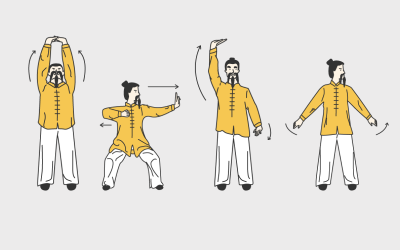Recently, the MBTI (Myers-Briggs Type Indicator) has gained popularity among young people, sparking a craze for online quizzes, workshops, and personality-based matchmaking services.
Many Chinese companies also use the MBTI for recruitment and team-building to enhance communication among employees.
Let’s explore this four-letter indicator and learn some useful vocabulary for describing personalities 🤓
What Is The MBTI?
The MBTI, also known as MBTI测试 (MBTI cèshì) is a personality assessment based on Carl Jung’s theories of psychological types.
It is mainly used to measure people’s psychological activities and personality types in obtaining information, making decisions, and dealing with life.

迈尔斯-布里格斯类型指标
Mài’ěrsī-Bùlǐgésī Lèixíng Zhǐbiāo
Myers-Briggs Type Indicator (MBTI)
The indicator was developed by Katharine Cook Briggs and her daughter Isabel Briggs Myers in the early 1940s and categorizes individuals into 16 distinct personality types across four dimensions:
🟡 Introversion (内向, nèixiàng) vs. Extraversion (外向, wàixiàng).
This dimension describes how a person gains energy. Extroverts tend to gain energy from the external world, while introverts gain energy from their internal world and solitude.
🟡 Sensing (感觉, gǎnjué) vs. Intuition (直觉, zhíjué).
This dimension involves the way information is received. Sensing individuals focus on reality and concrete information perceived directly through the five senses, while intuitive individuals focus on patterns, imagination, and possibilities.
🟡 Thinking (思考, sīkǎo) vs. Feeling (情感, qínggǎn).
This dimension describes the decision-making process. Thinking individuals focus on logic and objective standards while feeling individuals consider interpersonal relationships and others’ emotions.
🟡 Judging (判断, pànduàn) vs. Perceiving (知觉, zhījué).
Dimension involves one’s attitude toward the external world. Judging individuals prefer a planned and organized life, while perceiving individuals are more flexible, open, and like to keep their options open.
16 Personalities
There are a total of 16 personalities, each personality type is represented by a four-letter code, which provides insight into an individual’s preferences, behaviors, and interactions with the world.

16型人格
shíliù xíng réngé
16 personalities
PRO TIP
For many young Chinese, discussing MBTI types is a popular social activity (社交活动, shèjiāo huódòng). If you want to break the ice in conversations you can ask someone:
你是I人还是E人?
Nǐ shì I rén háishì E rén?
Are you introvert or extrovert?
lit. “Are you an i-person or an e-person?”
Now, let’s take a closer look at all 16 personality types. This way, you’ll be ready to discuss them with your Chinese friends, colleagues, or even on a date 😉
01. Architect (INTJ)
Architects are independent, confident, strategic, and good at planning and solving complex problems.

建筑师 (INTJ)
Jiànzhùshī (INTJ)
Architect (INTJ)
Architects are characterized by a unique combination of preferences: Introversion, Intuition, Thinking, and Judging.
Introversion 🌕🌕🌕🌗🌑 Extraversion
Intuition 🌕🌕🌕🌗🌑 Sensing
Thinking 🌕🌕🌕🌗🌑 Feeling
Judging 🌕🌕🌕🌗🌑 Perceiving
PERSONAL TRAITS OF ARCHITECT
自信 (zìxìn) – self-confident
有远见 (yǒu yuǎnjiàn) – visionary
逻辑性强 (luójíxìng qiáng) – strong logic
02. Logician (INTP)
Logicians are rational, independent, and curious, they are skilled in analysis and logical thinking and enjoy exploring theories and concepts.

逻辑学家 (INTP)
Luójíxuéjiā (INTP)
Logician (INTP)
Logic and reason are the most important traits and preferences of INTPs, which explains their nicknames.
Introversion 🌕🌕🌕🌗🌑 Extraversion
Intuition 🌕🌕🌕🌗🌑 Sensing
Thinking 🌕🌕🌕🌗🌑 Feeling
Perceiving 🌕🌕🌕🌗🌑 Judging
PERSONAL TRAITS OF LOGICIAN
理性 (lǐxìng) – rational
逻辑性强 (luójíxìng qiáng) – strong logic
好奇 (hàoqí) – curious
03. Commander (ENTJ)
Commanders are confident, and decisive, possess leadership qualities, and are adept at formulating strategies and achieving goals.

指挥官 (ENTJ)
Zhǐhuīguān (ENTJ)
Commander (ENTJ)
The extroverted nature of 指挥官 (Zhǐhuīguān) allows them to engage with people easily and gives them the ability to motivate and persuade others to do their best.
Extraversion 🌕🌕🌕🌗🌑 Introversion
Intuition 🌕🌕🌕🌗🌑 Sensing
Thinking 🌕🌕🌕🌗🌑 Feeling
Judging 🌕🌕🌕🌗🌑 Perceiving
PERSONAL TRAITS OF COMMANDER
领导能力 (lǐngdǎo nénglì) – strong leadership skills
自信 (zìxìn) – confidence
果断 (guǒduàn) – decisive
04. Debater (ENTP)
Debaters are sharp and curious minds, good at debating, enjoy challenges and innovation, and are eager to explore novel solutions.

辩论家 (ENTP)
Biànlùnjiā (ENTP)
Debater (ENTP)
The P in this personality type stands for Perceiving. Perceivers prefer flexible schedules and are spontaneous. They enjoy open-ended situations while avoiding decision-making.
Extraversion 🌕🌕🌕🌗🌑 Introversion
Intuition 🌕🌕🌕🌗🌑 Sensing
Thinking 🌕🌕🌕🌗🌑 Feeling
Perceiving 🌕🌕🌕🌗🌑 Judging
PERSONAL TRAITS OF DEBATER
有魅力 (yǒu mèilì) – charismatic
善于辩论 (shànyú biànlùn) – good at debating
机智 (jīzhì) – resourceful
05. Advocate (INFJ)
Advocates are quiet visionaries, often serving as inspiring and tireless idealists. They are caring for others, with a strong moral compass and sense of purpose.

提倡者 (INFJ)
Tíchàngzhě (INFJ)
Advocate (INFJ)
Out of all the MBTI personality types, the INFJ is the most unique as it is the result of a combination of preferences that generally exclude one another:
Introversion 🌕🌕🌕🌗🌑 Extraversion
Intuition 🌕🌕🌕🌗🌑 Sensing
Feeling 🌕🌕🌕🌗🌑 Thinking
Judging 🌕🌕🌕🌗🌑 Perceiving
PERSONAL TRAITS OF ADVOCATE
有同理心 (yǒu tónglǐxīn) – empathetic
利他主义 (lìtā zhǔyì) – altruistic
坚定 (jiāndìng) – firm
06. Mediator (INFP)
Mediators are poetic, kind, and altruistic people, always eager to help a good cause. They have a deep sense of empathy, understanding, and connection with the emotions of others.

调停者 (INFP)
Tiáotíngzhě (INFP)
Mediator (INFP)
People with the INFP personality type long for deep, soulful relationships, and they feel called to help others.
Introversion 🌕🌕🌕🌗🌑 Extraversion
Intuition 🌕🌕🌕🌗🌑 Sensing
Feeling 🌕🌕🌕🌗🌑 Thinking
Perceiving 🌕🌕🌕🌗🌑 Judging
PERSONAL TRAITS OF MEDIATOR
有同理心 (yǒu tónglǐxīn) – empathetic
忠诚 (zhōngchéng) – loyal
善良 (shànliáng) – kind
07. Protagonist (ENFJ)
Protagonists are inspirational optimists who are quick to take action in pursuit of what they believe is right.

主人公 (ENFJ)
Zhǔréngōng (ENFJ)
Protagonist (ENFJ)
They are skilled at organizing and coordinating people and resources to achieve their goals and also are persuasive communicators, able to influence others to adopt their point of view.
Extraversion 🌕🌕🌕🌗🌑 Introversion
Intuition 🌕🌕🌕🌗🌑 Sensing
Feeling 🌕🌕🌕🌗🌑 Thinking
Judging 🌕🌕🌕🌗🌑 Perceiving
PERSONAL TRAITS OF PROTAGONIST
鼓舞人心 (gǔwǔ rénxīn) – inspiring
热情 (rèqíng) – enthusiastic
精力充沛 (jīnglì chōngpèi) – energetic
08. Campaigner (ENFP)
Campaigners are passionate, creative, adept at inspiring others, and enjoy exploring new ideas and possibilities.

竞选者 (ENFP)
Jìngxuǎnzhě (ENFP)
Campaigner (ENFP)
竞选者 (Jìngxuǎnzhě) are sociable, warm-hearted, and open-minded. Their vibrant and positive outlook on life makes them stand out in any social setting.
Extraversion 🌕🌕🌕🌗🌑 Introversion
Intuition 🌕🌕🌕🌗🌑 Sensing
Feeling 🌕🌕🌕🌗🌑 Thinking
Perceiving 🌕🌕🌕🌗🌑 Judging
PERSONAL TRAITS OF CAMPAIGNER
心胸开阔 (xīnxiōng kāikuò) – openhearted
热情洋溢 (rèqíng yángyì) – enthusiastic
精力充沛 (jīnglì chōngpèi) – energetic
09. Logistician (ISTJ)
Logisticians are known for their practicality, reliability, and meticulous attention to detail. They are practical and fact-minded individuals, whose reliability cannot be doubted.

物流师 (ISTJ)
Wùliúshī (ISTJ)
Logistician (ISTJ)
The methodical approach of 物流师 (Wùliúshī) to problem-solving makes them excellent planners and organizers.
Introversion 🌕🌕🌕🌗🌑 Extraversion
Sensing 🌕🌕🌕🌗🌑 Intuition
Thinking 🌕🌕🌕🌗🌑 Feeling
Judging 🌕🌕🌕🌗🌑 Perceiving
PERSONAL TRAITS OF LOGISTICIAN
可靠 (kěkào) – reliable
务实 (wùshí) – enthusiastic
果断 (guǒduàn) – decisive
10. Defender (ISFJ)
Defenders are very dedicated and warm protectors, always ready to defend their loved ones. They are known for their kindness, dedication, and strong sense of duty.

守卫者 (ISFJ)
Shǒuwèizhě (ISFJ)
Defender (ISFJ)
Defenders are supportive and reliable, often going above and beyond to help those in need. They are nurturing and protective, making them excellent caretakers and trusted friends.
Introversion 🌕🌕🌕🌗🌑 Extraversion
Sensing 🌕🌕🌕🌗🌑 Intuition
Feeling 🌕🌕🌕🌗🌑 Thinking
Judging 🌕🌕🌕🌗🌑 Perceiving
PERSONAL TRAITS OF DEFENDER
友善 (yǒushàn) – friendly
忠诚 (zhōngchéng) – loyal
亲切 (qīnqiè) – kind
11. Executive (ESTJ)
Executives are decisive and clear-headed, with a strong sense of duty and responsibility. They value tradition and uphold standards, often setting high expectations for themselves and others.

总经理 (ESTJ)
Zǒngjīnglǐ (ESTJ)
Executive (ESTJ)
Executives are natural organizers who excel in taking charge and ensuring that everything runs smoothly and according to plan.
Extraversion 🌕🌕🌕🌗🌑 Introversion
Sensing 🌕🌕🌕🌗🌑 Intuition
Thinking 🌕🌕🌕🌗🌑 Feeling
Judging 🌕🌕🌕🌗🌑 Perceiving
PERSONAL TRAITS OF EXECUTIVE
务实 (wùshí) – pragmatic
精力充沛 (jīnglì chōngpèi) – vigorous
领导能力强 (lǐngdǎo nénglì qiáng) – strong leadership skills
12. Consul (ESFJ)
Consuls, identified by the personality type ESFJ, are known for their warmth, sociability, and strong sense of community.

执政官 (ESFJ)
Zhízhèngguān (ESFJ)
Consul (ESFJ)
Consuls are caring and supportive individuals who thrive on helping others and creating harmonious environments. They are often the glue that holds groups together, whether in family, work, or social settings.
Extraversion 🌕🌕🌕🌗🌑 Introversion
Sensing 🌕🌕🌕🌗🌑 Intuition
Feeling 🌕🌕🌕🌗🌑 Thinking
Judging 🌕🌕🌕🌗🌑 Perceiving
PERSONAL TRAITS OF CONSUL
友善 (yǒushàn) – friendly
负责 (fùzé) – conscientious
社交能力强 (shèjiāo nénglì qiáng) – strong social skills
13. Virtuoso (ISTP)
The Virtuosos are known for their resourcefulness and adventurous spirit. They are innovative and practical experimenters, and masters of all kinds of tools.

鉴赏家 (ISTP)
Jiànshǎngjiā (ISTP)
Virtuoso (ISTP)
Virtuosos have a knack for understanding the mechanics of systems and objects, often excelling in fields that require technical skills and practical know-how, such as engineering, mechanics, and craftsmanship.
Introversion 🌕🌕🌕🌗🌑 Extraversion
Sensing 🌕🌕🌕🌗🌑 Intuition
Thinking 🌕🌕🌕🌗🌑 Feeling
Perceiving 🌕🌕🌕🌗🌑 Judging
PERSONAL TRAITS OF VIRTUOSO
实用 (shíyòng) – practical
灵活 (línghuó) – flexible
独立 (dúlì) – independent
🤓 Chinese netizens have nicknamed this personality “Brother Drill” (钻哥 Zuān Gē) highlighting his skill in mechanical work.
14. Adventurer (ISFP)
Adventurers are free spirits who thrive on exploring new experiences and expressing themselves in unique ways. They are sensitive and often drawn to helping others and making the world a more beautiful place.

探险家 (ISFP)
Tànxiǎnjiā (ISFP)
Adventurer (ISFP)
Adventurers have a keen eye for aesthetics and often excel in artistic pursuits such as music, visual arts, and design.
Introversion 🌕🌕🌕🌗🌑 Extraversion
Sensing 🌕🌕🌕🌗🌑 Intuition
Feeling 🌕🌕🌕🌗🌑 Thinking
Perceiving 🌕🌕🌕🌗🌑 Judging
PERSONAL TRAITS OF ADVENTURER
温和 (wēnhé) – gentle
感性 (gǎnxìng) – perceptual
善良 (shànliáng) – kindhearted
15. Entrepreneur (ESTP)
Entrepreneurs are savvy, energetic, and very perceptive people who truly enjoy living on the edge. They are known for their energy, boldness, and knack for taking action.

企业家 (ESTP)
Qǐyèjiā (ESTP)
Entrepreneur (ESTP)
Their natural charisma and persuasive communication skills make them effective negotiators and leaders, often inspiring others with their confidence and drive.
Extraversion 🌕🌕🌕🌗🌑 Introversion
Sensing 🌕🌕🌕🌗🌑 Intuition
Thinking 🌕🌕🌕🌗🌑 Feeling
Perceiving 🌕🌕🌕🌗🌑 Judging
PERSONAL TRAITS OF ENTREPRENEUR
实用 (shíyòng) – pragmatic
善于辩论 (shànyú biànlùn) – good at debating
机智 (jīzhì) – resourceful
16. Entertainer (ESFP)
Entertainers are the life of the party, bringing joy and excitement wherever they go. They are spontaneous and playful, always eager to explore new experiences and share them with others.

表演者 (ESFP)
Biǎoyǎnzhě (ESFP)
Entertainer (ESFP)
Entertainers have a natural ability to make others feel comfortable and appreciated, often using their charm and wit to create a fun and lively atmosphere – life is never boring around them.
Extraversion 🌕🌕🌕🌗🌑 Introversion
Sensing 🌕🌕🌕🌗🌑 Intuition
Feeling 🌕🌕🌕🌗🌑 Thinking
Perceiving 🌕🌕🌕🌗🌑 Judging
PERSONAL TRAITS OF ENTERTAINER
友善 (yǒushàn) – friendly
活泼 (huópo) – lively
乐观的 (lèguān de) – optimistic
Your Turn!
Now it’s your turn to discover which of these 16 personalities you are.
👉 Take a quick test and share your results in the comments!
你的MBTI是什么?
Nǐ de MBTI shì shénme?
What’s your MBTI (Myers-Briggs Type Indicator) type?
Practice With Teacher
If you want to discuss your MBTI type and all the 16 personalities, book a free trial class with That’s Mandarin and practice with Chinese teachers.









0 Comments